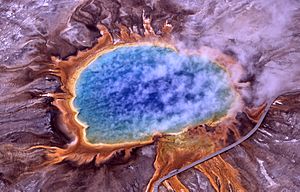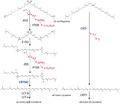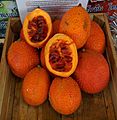Carotenoid facts for kids

Carotenoids are special colorful substances called pigments. They are found in many living things, like plants, some bacteria, and fungi. These pigments give plants their bright yellow, orange, and red colors.
Most animals cannot make carotenoids themselves. They get them by eating plants or other organisms that contain them. For example, flamingos get their pink color from carotenoids in the food they eat. Only a few tiny animals, like aphids and mites, can make their own carotenoids. They learned how to do this from fungi a long, long time ago.
There are more than 600 different types of carotenoids! They are split into two main groups:
- Xanthophylls: These carotenoids contain oxygen.
- Carotenes: These are made only of carbon and hydrogen, with no oxygen.
How Carotenoids Help Plants
Carotenoids are super important for plants and algae. They have two main jobs:
- Collecting Light: They help plants capture light energy from the sun. This energy is used for photosynthesis, which is how plants make their own food.
- Protection: They act like a shield for chlorophyll, the green pigment in plants. Chlorophyll can get damaged by too much sunlight, but carotenoids protect it.
One of the most common carotenoids in plants is beta-carotene. It helps plants stay healthy and grow strong.
Carotenoids and Your Body
Carotenoids are also good for humans and animals.
- Vitamin A: Some carotenoids, like beta-carotene, can be changed into vitamin A inside your body. Vitamin A is very important for good vision, a strong immune system, and healthy skin.
- Antioxidants: Many carotenoids act as antioxidants. This means they help protect your body's cells from damage.
- Eye Health: Certain carotenoids, such as lutein and zeaxanthin, are found in your eyes. They help protect the retina, which is the part of your eye that senses light. These carotenoids absorb harmful blue and near-ultraviolet light, keeping your vision sharp.
You can find lots of carotenoids in colorful fruits and vegetables. Think about carrots, sweet potatoes, apricots, and leafy greens!
Images for kids
See also
 In Spanish: Carotenoide para niños
In Spanish: Carotenoide para niños
 | Madam C. J. Walker |
 | Janet Emerson Bashen |
 | Annie Turnbo Malone |
 | Maggie L. Walker |







